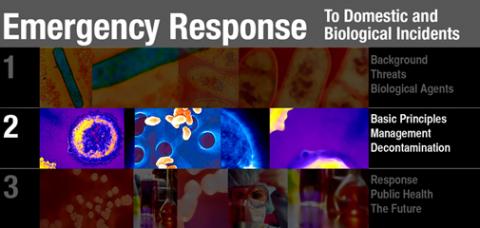This course has been divided into the three parts, each consisting of three modules. Module topics are outlined below.
- Part I
- Module 1: A Background for Bioterrorism
- Module 2: Threats and Vulnerabilities
- Module 3: Biological Agents, Effects, and Treatments
- Part II
- Module 4: Basic Principles in the Use of Biological Agents
- Module 5: Managing Biological Incidents
- Module 6: Immediate Actions and Decontamination
- Part III
- Module 7: Response to Bioterrorism
- Module 8: Response to Public Health Emergencies
- Module 9: Perspective on the Future of Terrorism
This course will cover modules 4 through 6
These modules contain practice exercises that will provide you with an opportunity to apply and better understand the material presented.
Intended Audience
representatives of state and local emergency response and public health agencies to perform safely and effectively during an incident involving biological agents.
Learning Objectives:
Upon completion of this course, participants will be able to:
- Describeskills necessary to effectively and safely, respond and manage public health emergencies, including domestic biological incidents
- Identifybiological agents based on their characteristics, symptoms, and the disease they cause
- Describebasic principles in the use of biological agents and the factors associated with a successful or unsuccessful terrorist attack
Pre-requisites/Learning Level
No pre-requisites
Competencies addressed
Core Competencies for Public Health Professionals identified
Domain 5: Community Dimensions of Practice Skills
- 5A5. Collaborates with community partners to improve health in a community (e.g., participates in committees, shares data and information, connects people to resources)
CEUs Offered
None
Cost
Free
Modality/format
Online Self-Pace
Length
1 hour
Presenter(s) and/or Content Experts
Technical requirements:
- Adobe Acrobat Reader
- Flash Player
- Speakers
Registration requirements
Register a free account
Creation and/or update
August 22, 2014





